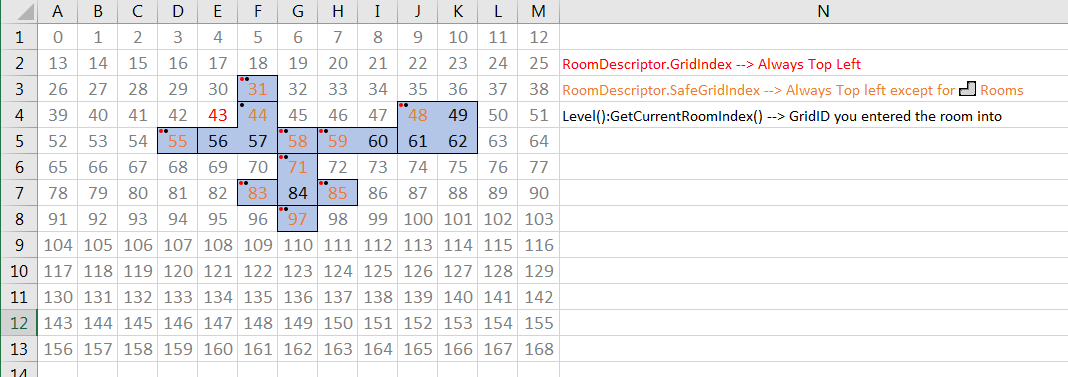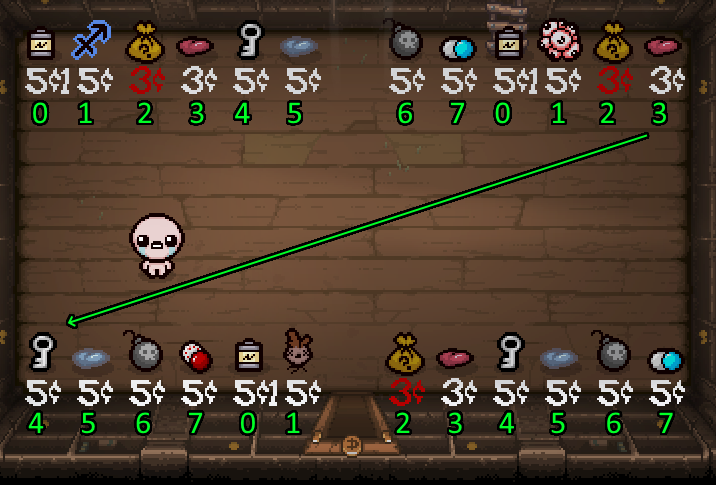Class "RoomDescriptor"⚓︎
Info
You can get this class by using the following functions:
Example Code
1 2 | |
Variables⚓︎
Allowed·Doors⚓︎
DoorSet AllowedDoors⚓︎
Contains data swapped just on load (in cases like minibosses, or other such events)
Bug
This variable contains userdata and is therefore not useable.
Award·Seed⚓︎
int AwardSeed⚓︎
used to spawn clear awards (normal, miniboss, boss rooms) and initialize shop items (shop, devil rooms)
Challenge·Done⚓︎
boolean ChallengeDone⚓︎
Clear⚓︎
boolean Clear⚓︎
Clear·Count⚓︎
int ClearCount⚓︎
room is clear, don't spawn enemies when visiting
Data⚓︎
RoomConfigRoom Data⚓︎
Decoration·Seed⚓︎
int DecorationSeed⚓︎
used for cosmetic stuff like backdrops, room decorations, shopkeeper skins
Delirium·Distance⚓︎
int DeliriumDistance⚓︎
Helper for The Void stage, holds the distance to the Delirium boss in room nr.
Display·Flags⚓︎
int DisplayFlags⚓︎
Indicates what is visible on the minimap. Display Flags (bitwise):
1 2 3 4 | |
Examples
The flags are hard to interpret, but here are some examples:
000 = invisible, this is how most rooms start
101 = standard room visibility, this includes rooms that are adjacent and you haven't actively visited. This will usually show icons.
011 = secret room, locked rooms, sac rooms pre-entry*
111 = 011 rooms after entry, but also the rooms directly adjacent to them* (applied after entry)
* If you have Spelunker Hat, bit 1 is completely unused. All special rooms will have the normal behavior of either 000 or 101. This is unique to Spelunker Hat; mapping items follow the normal rules.
Quote from User 'Budj'
From this my best guess is that bits 1 and 2 are special rendering (display) flags that may have more meaning down below.
The important bit for using them is minding that they're used differently mostly for special rooms.
As far as I've seen, 001 is completely unused. 010, 100, and 110 may be used for compass or blue map, I don't remember. I think they use 100.
Flags⚓︎
RoomDescriptor Flags⚓︎
The RoomDescriptor flags for the room.
Grid·Index⚓︎
int GridIndex⚓︎
Describes the index of the room on the level grid (13 by 13 cells). The index is the cell number on the grid, when counting them row by row from left to right.
- For a 1x1 room, this is equal to the 1x1 grid index of the room.
- For a room bigger than a 1x1 room, this is equal to the top left 1x1 quadrant.
- For
RoomType.ROOMSHAPE_LTLrooms (i.e. rooms that look like a "J"), this is equal to the 1x1 quadrant where the gap in the room is. In other words, it is a 1x1 quadrant that is not actually contained within the room. - Note that this value is different than the value returned by
Level:GetCurrentRoomIndex(). (That function returns the 1x1 quadrant that the room was entered in.) - Data structures that store data per room should use
ListIndexas a key instead ofGridIndex, since the former is unique across different dimensions.
Notes

Get dimension example code
A level can have multiple dimensions, which act as separate and independent level grids. Because of this, a room in dimension 1 can share the same grid index as a different room in dimension 2. Repentogon provides a GetDimension method, but if you don’t have access to it, you can use the following function to determine the dimension of a given room descriptor.
1 2 3 4 5 6 7 8 9 10 11 12 13 14 15 | |
Has·Water⚓︎
boolean HasWater⚓︎
List·Index⚓︎
int ListIndex⚓︎
The index for this room corresponding to the Level.GetRooms().Get() method. In other words, this is equal to the order that the room was created by the floor generation algorithm.
Use this as an index for data structures that store data per room, since it is unique across different dimensions.
No·Reward⚓︎
boolean NoReward⚓︎
Override·Data⚓︎
RoomConfigRoom OverrideData⚓︎
The room variant is in Data. Because Room::Init uses a mix of data, one from level layout and one from replacement data like minibosses, we need to hold the new room data somewhere.
Pits·Count⚓︎
int PitsCount⚓︎
Poop·Count⚓︎
int PoopCount⚓︎
Pressure·Plates·Triggered⚓︎
boolean PressurePlatesTriggered⚓︎
Sacrifice·Done⚓︎
boolean SacrificeDone⚓︎
Safe·Grid·Index⚓︎
int SafeGridIndex⚓︎
- For a 1x1 room, this is equal to the 1x1 grid index of the room.
- For a room bigger than a 1x1 room, this is equal to the top left 1x1 quadrant.
- For
RoomType.ROOMSHAPE_LTLrooms (i.e. rooms that look like a "J"), this is equal to the top right 1x1 quadrant. - Note that this value is different than the value returned by
Level:GetCurrentRoomIndex(). (That function returns the 1x1 quadrant that the room was entered in.) - Data structures that store data per room should use
ListIndexas a key instead ofSafeGridIndex, since the former is unique across different dimensions.
Notes

Shop·Item·Discount·Idx⚓︎
int ShopItemDiscountIdx⚓︎
- The index that denotes which shop item(s) will be discounted.
- Can be a value from -1 to 7.
- All items in the room with this ShopItemId will be affected by the discount.
- This is noticeable when there are more than 8 shop items in a room.
- A value of -1 means there is no discounted item.
- This value is unaffected by Steam Sale.
- Defaults to -1 in non-shop rooms.
- Can be modified by accessing the writable version of the RoomDescriptor like this:
1 2 3 4 5 6 7 8 9 10 11 12 | |
Shop·Item·Idx⚓︎
int ShopItemIdx⚓︎
- The ShopItemId value of the next shop item to add to the room.
- If this is set to 1 in a Room and another shop item is created, the new item will have a ShopItemId of 1, and the Room's ShopItemIdx will then be 2.
- Can be used as the total number of items in the shop, up to 7 items.
- Can be a value between 0 and 7.
- For every 8 items in a shop, this value resets itself to 0.
- For example, if a custom shop has 9 items, the 1st and 9th items will share the same ShopItemId of 0, and the RoomDescriptor ShopItemIdx value will be 1.
- Defaults to -1 in non-shop rooms.
- Can be modified by accessing the writable version of the RoomDescriptor like this:
1 2 3 4 5 6 7 8 9 10 11 | |
Notes
- In the image below, each item's ShopItemId is written underneath it.
- Notice how all items that share a ShopItemId have the same PickupVariant, but aren't identical.
- ShopItemDiscountIdx is 2, so all shop items with a ShopItemId of 2 are on sale.
- After all items are created, the ShopItemIdx for this room is 0.

Spawn·Seed⚓︎
int SpawnSeed⚓︎
used to spawn entities at room load and initialize enemy drop seeds
Surprise·Miniboss⚓︎
boolean SurpriseMiniboss⚓︎
Visited·Count⚓︎
int VisitedCount⚓︎
how often the room has been visited